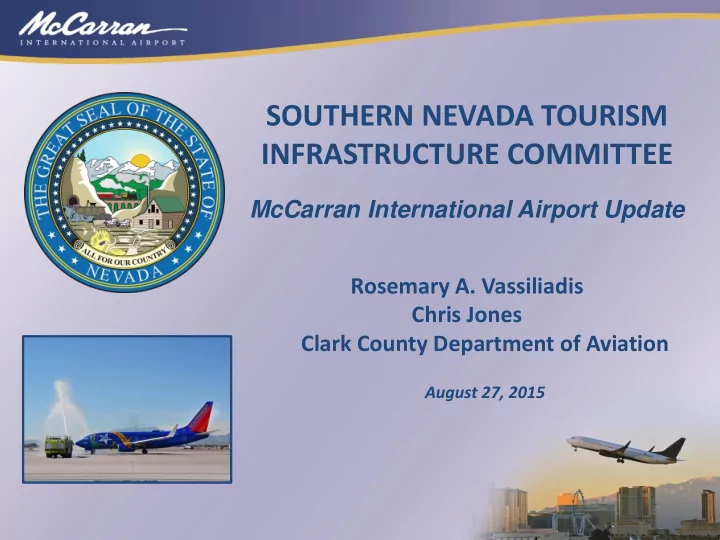

SOUTHERN NEVADA TOURISM INFRASTRUCTURE COMMITTEE McCarran International Airport Update Rosemary A. Vassiliadis Chris Jones Clark County Department of Aviation August 27, 2015
E XECUTIVE ORDER: “The Southern Nevada Tourism Infrastructure Committee shall … Evaluate current tourism-related transportation modes and infrastructure, including but not limited to, airport facilities, public and private mass transit, and transportation infrastructure, and identify areas of need and make recommendations for improvements” - Governor Brian Sandoval
We Welcome the World
We Welcome the World
McCarran Field
A History of Forward Thinking D Concourse, opened 1998 McCarran 2000 expansion, opened 1985
Terminal 3: A Worthwhile Investment 14 additional gates, including seven international Expanded U.S. Customs facility Tunnel link supports expanded use of D Concourse State-of-the-art technologies Increased operational flexibility
McCarran International Airport today
The Clark County Department of Aviation Business Enterprise Fund Does not receive any tax revenue from the County or State. Generates an annual economic impact of close to $30 billion for Southern Nevada.
Sources of Revenue: $599.5 million for Fiscal Year 2014 Non-Airline Airline 49% 51%
Competitive costs vs. industry 35.00 $29.10 30.00 $27.80 25.00 $17.21 20.00 $16.26 $17.25 $16.98 15.00 $11.09 $11.92 $10.59 $11.49 10.00 5.00 0.00 JFK EWR LAX LGA ORD SFO LAS SJC DEN SAN FY13 FY14 FY15 McCarran’s cost per enplaned passenger (CPE) has been reduced for three consecutive years, to an estimated $11.66 for FY16.
An Integrated Aviation System Clark County operates a system of five airports: McCarran International North Las Vegas Henderson Executive Key Goal: Jean Sport Aviation Center To preserve the limited Overton/Perkins Field commercial airspace that is only available at McCarran.
More than 1,400 employees work for the Department of Aviation and another 14,500 work for airlines, tenants and concessions. Last year, McCarran hosted nearly 42.9 million passengers, a 2.4 percent increase compared to 2013. McCarran now handles more than 120,000 passengers per day. In 2014, McCarran was the nation’s ninth - busiest airport, and ranked as the 25 th - busiest airport worldwide based on total passengers. Last year, McCarran was the eighth-busiest airport in the world based on total operations.
Key Fact: McCarran is the second-busiest Origin and Destination (O & D) airport in the United States. This means nearly 90 percent of McCarran’s passengers utilize all aspects of the operation: roadways, check-in lobby, security checkpoints, baggage claim, etc.
LAS is the Second Largest O&D Airport in the U.S. 48,382 39,982 38,803 37,183 36,172 35,735 35,448 31,862 30,926 30,369 29,838 29,145 24,787 24,053 23,375 22,291 21,734 21,284 20,251 19,903 LAX LAS DEN ORD MCO SFO ATL BOS SEA LGA DFW PHX JFK FLL EWR MSP SAN DCA PHL TPA Source: U.S. DoT DB1b database, via Diio Mi Daily Passengers Each Way – Year-Ending 2014Q4
Air Carriers at McCarran AeroMexico Alaska Air Canada Allegiant British Airways As of August 2014: American/US Airways Condor Delta Air Lines Copa Nonstop service was Frontier Edelweiss available to more than 140 Interjet Hawaiian cities, including two dozen Magnicharters international destinations. jetBlue Norwegian Air Omni Korean Air Southwest Sunwing Spirit Thomas Cook Virgin Atlantic Airways Sun Country VivaAerobus United Volaris Virgin America WestJet
Passenger activity: 1985 through 2014 2007: 47.7 million 2014: 42.9 million
Air Service Development From 2009 through 2014, McCarran’s domestic passenger totals increased by 1.2 million, or approximately 3 percent. McCarran is served by every major U.S. air carrier, from legacy to ultra-low-cost airlines. The United States air service market is mature, with McCarran already enjoying nonstop service from nearly every major airport in the country. Increased market share will come from additional frequencies and added seat counts on flights serving existing markets.
Casting a wide net Foreign flag carrier passenger numbers at McCarran increased 60 percent from 2009- 2014 – also a 1.2 million net annual gain. Canada (1.7 million passengers last year) and Mexico (586,000) remain top non-U.S. feeder markets. Trans-Pacific service is primary emphasis. Currency valuations and government- imposed hurdles are concerns. We enjoy a strong & unique partnership with the Las Vegas Convention and Visitors Authority.
Critical Partnerships Airlines and tenants Federal agencies Federal Aviation Administration Transportation Security Administration U.S. Customs and Border Protection Resort operators Local government agencies Law enforcement Elected officials Las Vegas Convention and Visitors Authority Industry trade groups
Looking ahead: The next 25 years
The sky is the limit Airfield Roadways Terminals
Maximum Capacity McCarran’s annual passenger limit is approximately 55 million. Clark County strongly supports the “Next Gen” program. The Federal Aviation Administration has started a 3-year-long “Metroplex” study to determine the safest and most efficient means of managing local commercial airspace within the confines of a national system, and in close proximity to Nellis Air Force Base. The FAA’s findings may result in changes to the local flight patterns of commercial aircraft.
More International Gates
Ivanpah … The $10 billion question
McCarran has set the stage Terminal 3 is a tangible investment in Clark County’s future. With 110 gates and two stand-alone terminals, McCarran is poised to handle approximately 55 million passengers per year. Recent visitation trends suggest a need for 120 deplaned air passengers per year, per room, to maintain local occupancy rates in the mid-80 percent range. At this rate, McCarran can support the development of at least 30,000 additional guest rooms. Management is now focused on the further development of an airportwide culture to improve McCarran’s customer service and hospitality standards. The Ivanpah site will be held in reserve for future development of the Southern Nevada Supplemental Airport when passenger demand warrants.
Infrastructure Needs Address long-term fuel redundancy for aviation Address surface movement challenges between the Airport- Strip-Convention Corridor
Questions & Answers
Thank You
Recommend
More recommend